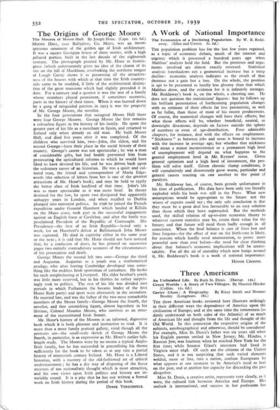A Work of National Importance
THE population problem has for the last few years regained, as a topic of economic debate, much of the interest and urgency which it possessed a hundred years ago when Malthus' analysis held the field. But the premises and argu- ments involved are almost exactly reversed. Statistical analysis foreshadows not a geometrical increase but a steep dedine : economic analysis indicates as the result of that decrease not a gain but a loss. On the whole, the position is apt to be presented as hardly less gloomy than that which Malthus drew, and the evidence for it is infinitely stronger. Mr. Reddaway's book is, on the whole, a cheering one. He does not question the statisticiPns' figures : but he follows up his brilliant presentation of forthcoming population changes with an estimate of their effects far less pessimistic, as well as far fuller, than those of most of his recent predecessors. Of course, the numerical changes will have their effects; but what those effects will be, whether beneficial, neutral, or downright disastrous, depends on factors outside the sphere of numbers or even of age-distribution. Four admirable chapters, for instance, deal with the effects on employment. " Stickiness " as between jobs and areas is bound to increase with the increase in average age; but whether that stickiness will mean a minor inconvenience or a permanent high level of unemployment will depend on what happens to the general employment level in Mr. Keynes' sense. Given general optimism and a high level of investment, the pro- blem will solve itself. Given chronic slump conditions, it will cumulatively and disastrously grow worse, particular and general causes reacting on one another to the point of paralysis.
Mr. Redclaway has, of course, been grossly unfortunate in his time of publication. His data have been only too literally exploded while his book was still in the Press. What new assumptions would be appropriate to the future not the wisest of experts could say ; the only safe conclusion is that they must be a great deal less favourable to an easy solution than those which they have superseded. But the methods used, the skilled relation of up-to-date economic theory to whatever current statistics may be, retain their value for the future; and that future will need them badly enough in all conscience. When the final balance is cast of lives lost and lives forgone—for the effect of war on the birth-rate is likely, for reasons which hardly need enumeration, to prove more powerful now than ever before—the need for clear thinking about that balance's economic implications will be unmis- takable. For all the air of unreality which now hangs around it, Mr. Reddaway's book is a work of national importance
HONOR CROOME.












































 Previous page
Previous page